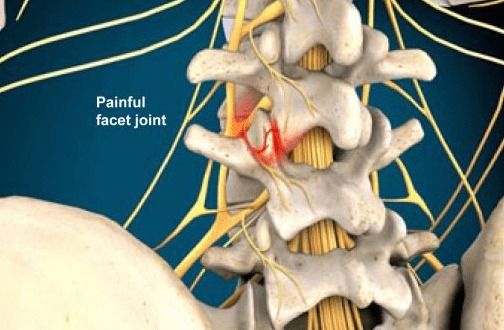A medial branch block is a procedure used to inject a local anesthetic near the nerves connected to facet joints of the spine. If the pain goes away immediately, the facet joints can be identified as the source of the pain.
Pain from the facet joints can be acute or chronic. An ache in the joints of the lower back usually radiates to the buttocks and upper thighs. The discomfort gets worse with bending or standing. In the cervical joints, the ache radiates through the neck and shoulders. The pain often gets worse when looking up or from side to side.
What does the procedure involve?
The injection only takes a few minutes, but the entire procedure lasts around an hour. The doctor first numbs the skin and then injects an anesthetic around the nerves. The patient may feel some temporary pressure at the site of the injection.
The procedure is usually done with the patient lying on his side for a cervical injection or on his stomach for a back injection. After cleansing the area, the doctor will insert small needles along the bones that outline the medial branch nerves. A small amount of the anesthetic will be injected along each nerve.
What happens after the procedure?
Patients should take it easy for a day or so after the procedure but can go back to work the next day in most cases. A medial nerve block is a diagnostic test that is done to predict the success of a radiofrequency lesioning of nerves near the spine. Any relief that occurs because of the procedure goes away within two days.
Although the procedure can identify the source of pain, it does not necessarily tell the doctor how effective the radiofrequency lesioning would be in eliminating pain. Causes of pain and the body’s reaction to it vary among individuals. If a person does not get relief from the diagnostic injection, however, he is not likely to benefit from the lesioning.*
Are there side effects or risks?
Temporary pain from the injection is the most common side effect. Risks are rare but may include bleeding, nerve damage, or infection. The procedure may not relieve pain for some patients. Anyone with allergies to any of the medications used in the procedure should not have the injection. Anyone who takes blood thinners or anti-platelet drugs should get advice from a doctor about safely stopping these medications before having a medial branch block.
Patients who respond well to the diagnostic test are likely to respond well to a radiofrequency neurotomy or lesioning. This is an injection procedure used to heat nerves to stop them from carrying pain signals. Other functions, such as muscle strength and sensation, are not affected by the process.
*Results vary and are hard to predict.
Enjoy an active body and a happier life…at the Advanced Spine Center Make an Appointment today!










